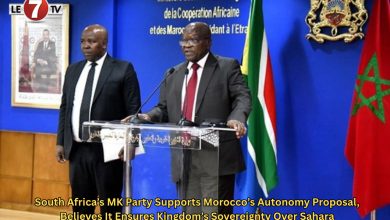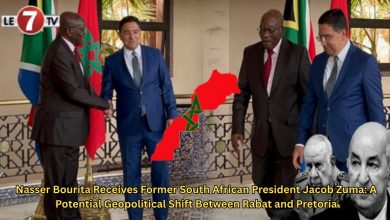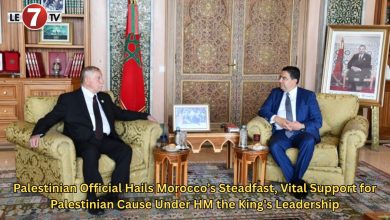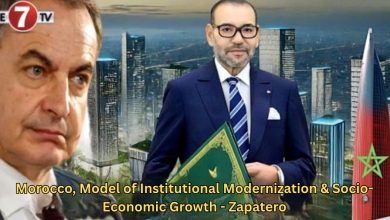Throne Day: Celebrating Forward-Looking Royal Vision for Emerging, Modern & Prosperous Morocco
Rabat - Moroccans will celebrate the glorious Throne Day on July 30, an occasion to proudly celebrate the proactive, foresighted and forward-looking vision of His Majesty King Mohammed VI, who transformed the Kingdom into an emerging, modern and prosperous country.
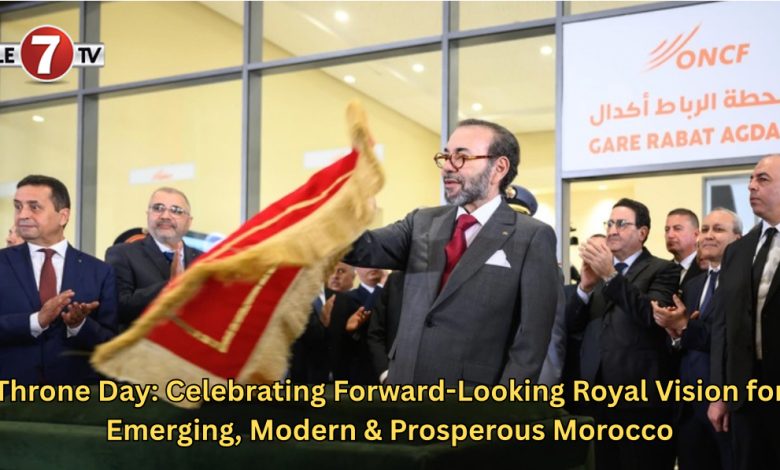
Throne Day stands as a powerful moment of national unity, as well as an opportunity to reflect on the progress made and to look toward an even more promising future. It is the resounding expression of unwavering bonds between the Glorious Alaouite Throne and the loyal Moroccan people.
This year’s anniversary of the King’s Accession to the Throne comes as the Kingdom is reaping the fruits of 26 years of tireless work, under a modernist project shaped and implemented through the impetus of a visionary Sovereign.
Major structural reforms have deeply transformed Morocco economically, socially, culturally, institutionally, and in the realm of sports, driven by a dynamic wave of all-encompassing reforms that have touched all vital sectors of the country and the entire national territory.
This was echoed by Former head of Spanish government José-Luis Rodriguez Zapatero, in an interview with MAP-Madrid, underlining that today, more than ever, Morocco stands as a “beacon of economic, social and institutional modernization”.
Nowadays, the Kingdom boasts high-quality infrastructure in diverse areas, including highways and expressways, with a network exceeding 2,000 km and expected to reach 3,000 km by 2030; Africa’s first high-speed rail line (LGV); and world-class ports such as Tanger Med, ranked among the top 20 container ports globally and the leading port in both the Mediterranean and Africa. Other ambitious projects include Nador West Med and Dakhla Atlantique ports.
To many observers, Morocco stands out in energy and green transition as a global and African leader in renewables, with internationally renowned solar and wind power plants and ambitious green hydrogen production projects.
Economically, the Kingdom is now recognized as a logistics and industrial hub in strategic sectors such as automotive, aerospace, and agri-food. Today, it is currently well-positioned to join the top 50 of the World Bank’s “Doing Business” rankings.
These extensive efforts are accompanied by significant social and human development reforms, reflecting His Majesty the King’s deep humanistic and social sensibility, who continuously places a high priority on ensuring disadvantaged populations benefit from the benefits of national development.
In an interview with MAP-Paris, French geopolitician Frédéric Encel noted that Morocco, under the leadership of His Majesty King Mohammed VI, is engaged in an “impressive” development momentum, earning it recognition as “a true emerging country”.
In this spirit, programs such as the National Initiative for Human Development (INDH) and the massive project of universal social coverage are ongoing, alongside flagship projects such as the reform of the Family Code, digitalization of public services, and the education sector.
Since His Majesty’s accession to the throne, Morocco has strengthened its geopolitical positioning through efficient, assertive and proactive diplomacy, securing numerous achievements in defending the Kingdom’s territorial integrity.
In an interview with MAP-Brussels, Francis Delpérée, constitutional expert and former Belgian senator, joined in praising the diplomatic advancements achieved by the Kingdom, thanks to the insightful vision of His Majesty the King. To him, these successes have helped garner broad international support, particularly from major world powers, for a definitive resolution of the artificial conflict over the Moroccan Sahara, based on the Moroccan Autonomy Plan.
In recent years, Morocco’s national cause has made significant strides thanks to the strong impetus and direct involvement of His Majesty the King, who has laid out the Kingdom’s fundamental stance on the Moroccan Sahara.
Following the United States, Spain, France, and recently the United Kingdom have aligned with this approach. In total, no fewer than 123 countries globally now support Morocco’s Autonomy Initiative.
On the African continent, Morocco continues to build its presence and image as a nation that acts for Africans and with Africans. Following its triumphant return to the African Union in 2017, Morocco launched major initiatives for the continent, including the Royal Atlantic Initiative, enabling Atlantic Ocean access to the landlocked Sahel countries, and the African Atlantic States Process, along with the African Atlantic Gas Pipeline.
Sports is another sector where Morocco has made major strides in recent years. Results on the ground reflect the rising profile of national sport, guided by a perceptive and visionary Royal Vision.
Morocco, the first Arab and African country to reach the semi-finals of the 2022 FIFA World Cup in Qatar, continues to shine in sports, through competitive performance, infrastructure development, and training programs.
Crowning this momentum, Morocco has been chosen by FIFA to co-host the 2030 World Cup alongside Spain and Portugal. This is the first time the tournament will be held across two continents, underscoring Morocco’s unique role as a bridge between North and South.
In this regard, Zapatero expressed confidence in Morocco’s ability to successfully co-host the 2030 World Cup, highlighting the country’s ‘professionalism,’ ‘infrastructure,’ and the ‘enthusiasm’ of the Moroccan people.
Throne Day remains a solemn moment for all Moroccans to jointly celebrate these achievements, reflecting the maturity of a societal project crafted and led by a visionary Sovereign who remains attentive to His people and their concerns.
Editorial team/le7tv





